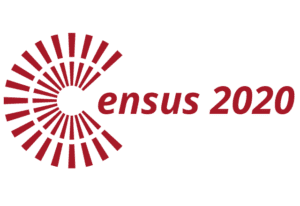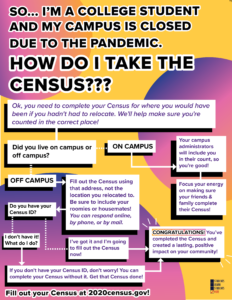The Census Bureau has updated its timeline for the 2020 Census. Campus Compact Illinois will be working with our partners to get you up-to-date information about how this will effect campuses and their communities.
Census 2020
- Counting for Dollars 2020: This document from the George Washington University Institute of Public Policy provides a detailed list of the programs which receive funding based on census counts, including how much money comes to Illinois for each program. (See the Illinois report here. Find other state’s reports here.)
- Census 2020: Illinois has lost a House of Representatives member every year for over 50 years. In 2020, Illinois is slated to lose one or even two more representatives. This article shows why census 2020 is so important for Illinois, The Stakes Couldn’t Be Higher in Illinois
- Mapping Historically Undercounted Communities: This interactive map allows users to search for and identify census tracts in their area that have been historically undercounted. It’s a project of CUNY Mapping Service at the Center for Urban Research, CUNY Graduate Center. (See Census.gov map here) (See simplified map here.)
Learn how higher education can support a fair and accurate count.
FERPA Guidance from the Department of Education for the 2020 Census
- Issue: People don’t know why it’s so important
- Develop educational exercises and resources for use in classes.
- Inform how the census affects them, their families, and their local communities. (Information here)
- Issue: Distrust
- Prepare students as liaisons to their own hard-to-count communities.
- Help dispel common myths and misconceptions about the Census. (Information here)
- Issue: Staffing
- Get career centers equipped to help students access Census jobs or apply yourself to get extra money. (Information here)
- Issue: People want training
- Develop resources on how the census works.
- Learn more about the barriers and concerns people face and how to help people overcome those issues. (Information here)
- Issue: Off-campus students
- Develop campus systems and awareness-raising for these groups of students who live at home, who rent, who couch surf, or don’t have a stable home. (Information here)
- The census takes place starting April 1st, 2020 and is based on the address where someone is living/staying on that specific day.
- Student highlight: It is NOT based on your “permanent address” or who might claim you as a dependent on their taxes.
- Students who live on campus in residence halls will have their census information completed for them by their college or university. Everyone else must complete one census form on their own for all the people living at their address.
- First people will be asked to complete an online Census form. Those who don’t respond will then receive a paper form in the mail. Census enumerators, people from your area who are being employed by the Census, will come to the doors of those who don’t complete the paper form.
- The United State Census Bureau can be a useful resource for general questions about the census and how it’s going to to work.
Does the risk of not participating outweigh the risk of participating?
There are many factors that may lead to an undercount in the Census:
- Citizenship status question – The Supreme Court ruled in favor of not adding the citizenship question, and the current administration dropped its’ efforts to add the question. It is still unseen how these events unfolded will affect participation in Latinx communities. Information here
- Many people face barriers to participation, such as people experiencing homelessness, and those speaking languages that the Census will not be translated into, such as Hmong, Oromo, and Somali. Information here
- Many communities have uncertainty about whether participating in the Census is worth the potential risks, such as immigrant communities concerned about how the citizenship status question might be used and Native nations with questions of sovereignty and history of forced removal.
- Off-campus, renters, and highly mobile students are at risk of going uncounted for a range of reasons. Information here
Lots of temporary staff from the most impacted communities are needed!
Illinois
- ILCountMeIn2020
- Fellow Toolkit developed by Adler Interns (Updated 11/12/19)
- Illinois Complete Count Commission
- Illinois State Data Center – Northern Illinois University
- Illinois Library Association
- City of Chicago Census Resources
National
- National Conference of State Legislatures
- Faith in Public Life
- Funders Committee for Civic Participation
- The Leadership Conference on Civil and Human Rights
- Education Census.gov Resources
- Promotional and Marketing Census.gov Resources
- K-12 School Census Resources for Teachers
Social Media/Messaging Templates
Are you a trusted messenger? Think about communities you’re connected to; geographic, cultural, religious, campus student groups, or other communities. Are you a trusted messenger in those spaces? If the census matters to you, you may be able to help others in those communities get information about and participate in the upcoming census. On the other hand, there is so much distrust about the census that it can actually be harmful for “outsiders” to enter communities where they do not have a pre-existing trusting relationship to try to help people participate in the census. Self-awareness and reflection are important first steps prior to deciding how to be helpful.
-
- Work for the Census. These are part-time jobs that can be done in the evening or weekend and pay well. The Census Bureau particularly needs people with language skills and relationships in their own communities who can help achieve a complete count. Due to the low unemployment rate, the Census is working hard to fill these positions. If part-time work in your own community could be a fit for you, consider applying. More information here
- Talk to friends, family, and neighbors about the 2020 Census. A lot of people just don’t know the census is coming, and once they understand how important it is to their communities and that others they trust think it matters, they do, too. More information here
- Commit to Count Table. Set up a table on campus before the census to provide information, have people commit to participate in the Census, and write reminder postcards to have sent to themselves.
- Help people complete the Census form. If you’re a trusted member of a community, you could be an important helper. Libraries, schools, and other familiar and trusted community centers can be places where neighbors access computers and get help completing the Census form for their household.
- Join a Complete Count Committee. Across the state, people are coming together to form Complete Count Committees (CCC). You can form a CCC around a physical or interest community, or connect to one that already exists. Learn about CCCs here
- Contact a Local Library or League of Women Voters. Organizations such as libraries and local LWV chapters are organizing to support complete census counts. Find one near you and reach out to see if you can support their efforts. League of Women Voters information here
- Contact Illinois Complete Count Commission to learn about how the census will affect Illinois and how you can help get an accurate count. Information here
- Census Bureau COVID-19 Guidance
- The key takeaways are:
- Students should still be counted in their campus community whether they are living in on or off campus housing. Per the Census Bureau’s residence criteria, in most cases students living away from home at school should be counted at school, even if they are temporarily elsewhere due to the COVID-19 pandemic.
- For Off Campus Students, continue to encourage them to fill out the Census online at https://my2020census.gov/. They do not need to have their letter or their Census ID number to fill out the form online. The Census website can identify them with their off-campus address. They should communicate with roommates to designate one responder.
- For on-campus counts, Campus officials should continue to work with the Census Bureau Groups Quarters contact person. Schools that chose to do student self-response are being given the option to switch to eResponse methodology. Your Census contact should be reaching out to you but you should also feel free to contact them directly. If you don’t know who that is, I am happy to try to help.
- The Early Nonresponse Followup Operation (when census takers knock on doors) has been pushed back from April 9th to April 23rd. At this point we don’t know how many students will be back in their campus residences at that time so please continue to encourage off campus students to respond online.
- What Campuses Should be doing:
- Use your normal online platforms to continue to remind students about the Census and their responsibility. The Census Bureau has some useful graphics: Educator Outreach Material
- The Census Open Innovation Lab (COIL) has created a number of social media friendly memes, videos, and posts that can be used for different audiences.
- Ask Student Leaders to use TikTok, YouTube, Instagram, Twitter, Facebook and any other social media platform to get out the Census message.
- Does your President or Football Coach or a popular professor have a large following on social media? Reach out to those trusted, popular voices to get the message to students.
- Remind all faculty and staff that are interacting with students online that the Census is still happening. Ask them to put a Census message in their signature or syllabi.
- Webinar for International Students on Census and COVID-19 – March 27, SIUE
- The key takeaways are:
Latest Updates on Group Quarters Count (3/27/20):
-
-
- College and universities are now allowed to submit incomplete questionnaires if using the e-response option. Census is still encouraging providing as much information as possible.
- The Group Quarters operation has been delayed for two weeks, which will now occur on April 16-June 19. Group Quarters staff have paused in reaching out to universities that select paper based operations and will resume in two weeks.
- During the delay, GQ and other operations impacted by the delay, are meeting to make critical decisions for operations.
- If a college/university did not receive an initial call or visit during Group Quarters Advanced Contact, please send an email to dcmd.group.quarters {at} census(.)gov.
- If you have additional questions after reading the latest information (link below), please send an email to the above group quarters address.
- Delayed Operational Start Dates
- Latest information on Group Quarters
-
Campus Compact will continue to update this page as more information about campus responses to the Census amid the COVID-19 response become available. If you have anything resources to add, please email nfurlett {at} compact(.)org.
The Spanish Community Center is looking for volunteers available to help their phone banking efforts. All training and volunteering will be done online. Contact Verenise Alvarez verenise {at} spanishcenter(.)org or 779-875-3928.
The Coalition for a Better Chinese American Community is also looking for phone bank volunteers. Please Contact Grace Chan McKibben gracechan {at} cbcacchicago(.)org or 773-405-6770.
Both organizations are looking for bilingual volunteers (Spanish, Chinese (Mandarin or Cantonese), etc.).
Chicago Cares invites you to take part in spreading the importance of the 2020 Census-from your home! In partnership with the City of Chicago Mayor’s Office, Chicago Cares is hosting a multi-week digital Census outreach campaign. Through this project, volunteers will use phone and text banking software to reach communities that are underrepresented in Census self-reporting to date. Census data directs billions of dollars of funding into communities each year and Illinois is at risk of losing significant funding and two Congressional seats if we are not accurately represented in the 2020 Census. Do your part and help spread the word! Learn More and Sign Up Here!!



